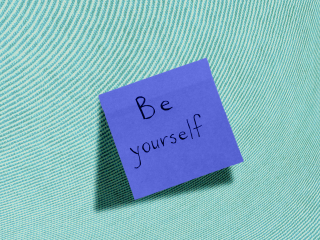If you’ve ever lost a family member, friend, or pet, you know the whole grieving thing can throw you for a loop. A song can trigger memories of when they were still around. Or you might lose it when you realize you can’t send those silly “this is you” DMs to them anymore.
Despite what some (misguided) folks might say, moving on doesn’t simply take time. “When a person dies, physically they're not there, but spiritually, they still are. You're still tethered to them through love,” says Mekel Harris, PhD, licensed clinical psychologist and the author of Relaxing Into the Pain: My Journey Into Grief & Beyond.
Though you might've heard about the five stages of grief—denial, anger, bargaining, depression, and acceptance—grieving doesn’t follow a specific order or timeline, Dr. Harris says. Because of that, there’s also no one-size-fits-all way to cope, making loss tricky to process.
Still, making space to engage with anger, denial, depression, or whatever part of grief you’re feeling can help you work through it. “It's not that grief minimizes or shrinks, but your perspective and your perception of it can change over time,” Dr. Harris says.
Here, we spoke to a bunch of people who found ways to sit with their loss by taking action, shifting their mindset, or honoring their loss in a helpful way—plus a few ideas from therapists. Keep reading for coping strategies that honor your loved ones and help you work through a loss.
1. Share stories about them.
“When my best friend Alyssa died in 2017, a lot of her friends reached out to me—people I’d never met or even heard her talk about. They all wanted me to share stories about her with them so they could have something to hold on to, so I asked for the same. It was like writing a storybook about a girl through different perspectives and lived experiences.
About a month after she died, [one guy] told me he met Alyssa while she was on a road trip. He sent me a video of their day together, and it made me cry instantly. It was my friend navigating a seemingly innocuous day with someone she didn’t know well. She was so spirited, so curious, the way one is when hitting it off with a stranger.” —Mary M.K., 40
2. Create a holiday in their memory.
“This ritual gives you some control in a situation that leaves so little of it. [The holiday to celebrate them] can be any day of the year, not just their deathiversary or anniversary of a diagnosis or any other difficult date. That can lessen the emotional charge of those days too.
One of my good friends created something called the Dave Johns Memorial Big Mac Day in honor of her dad, who loved McDonald's. Each year on his birthday, she asks friends to eat or drink something decadent in his memory and post about it on social media. The best part? This way of connecting with her father ended up becoming something fun and communal that makes her feel a lot less alone.” —Rebecca Soffer, author of The Modern Loss Handbook: An Interactive Guide to Moving Through Grief and Building Your Resilience
3. Tap into the things they loved.
“Dad was a rebel, and he wouldn’t have wanted a stuffy service. Instead, we held a gathering at a local pub that my dad loved. We invited everyone from the community because he owned a comic book shop, where people felt at home and able to be themselves, for over 30 years. At the event, we had a table where people could grab stuff he had lying around the store: Green Lantern rings, Free Comic Book Day lanyards. That way, people could take something to remember him.” —Nick G. 38
4. Create a living memorial.
“In the military, many of us create spaces designated to honor our fallen. Unlike national memorials, these spaces evolve as friends of fallen service members leave things that remind them of the person who passed.” —psychologist Tanya S. Crabb, PsyD
5. Communicate with your guilt.
“Often when someone dies, we're flooded with the would've, could've, should've of what we wish we had said or done differently. I help my clients acknowledge and recognize what they feel and get curious. What is the guilt trying to communicate to you? Knowing that can guide you in how to cope. Do you need to write a letter to the person who has passed? Is there someone in common that you need to share your feelings with? Do you want to reflect on parts of yourself that you'd like to change to shift your relationships with the people who are still in your life?” —therapist Jesse Kahn, LCSW-R, CST
6. Do the things you used to do together.
“My dog Piggy wasn’t just a service dog—he was my BFF for over 10 years and my shield against sensory overload. Together, we volunteered at schools for special needs and high-risk children. We even created a curriculum based around his life as a three-legged rescue dog to inspire the kids we worked with. When he passed in 2020, I expected that continuing would be too painful. But over time, my work with the non-profit I co-founded in his name evolved into disability work, making sure everyone has a chance to experience the world, like Piggy did for me. It’s still hard to picture life without him, but doing things I know would make him smile helps me smile again.” —Tod E., 48
7. Plant a tree.
“In Russian, which I speak, the word for "fig" is a euphemism for "get lost," so I used to joke that I wanted a fig tree planted by my grave. When my dog died unexpectedly, I was inconsolable, and my mom suggested I plant a tree at her grave. I was comforted knowing that life continues from death.” —Veida L., 28
8. Remember fallen friends as honored guests.
“A tradition we have in the military is continuing to include our fallen in our ceremonies, almost as honored guests. Every formal function I have attended has had a Prisoner of War/Missing in Action table. Often, it’s a round table set with a white tablecloth, a single candle, a single red rose in a vase, and a plate with a lemon and pinch of salt. Everything is symbolic. The round table shows that our concern never ends. The lemon represents their bitter fate, and the salt represents the tears shed by their families. It’s a powerful acknowledgment of those we lost. In that way, our missing are included and never forgotten.” —Tanya S. Crabb, PsyD
9. Give prayer a shot.
“When my dad died suddenly at the age of 82, I felt alone. I talked to someone in my 12-step program about it, and she told me to pray for my dad. I didn’t understand much about spirituality or a higher power, but I prayed and envisioned my dad going higher into heaven. Praying felt like sending him love and helped me realize that a higher power was always with me. When my sister later died unexpectedly, I knew a higher power would care for us.” —Jane S., 72
10. Write letters to them.
“Often, accepting the idea that our loved one is not a part of our future can be some of the most difficult work in the healing journey. If you miss someone, you can write letters to them, keeping them updated about what is going on in the world. You can also imagine what their responses would sound like. It can serve as a transition. If you are used to speaking with someone every night, letters allow you to have those conversations as you transition into life without the person.”—therapist Ahvegyil Skolnick, LCSW
11. Continue to work on your collective goals.
“My wife died a few years ago, but I feel like I’m still in a partnership. My wife and I had plans for how we were going to turn our community into something wonderful for everyone. The plan has not become mine alone; it has continued to be ours, and the decisions that I make now are based on the ideas that we had together. Her story ended, but our mission continues.” —Robert K. 63
Quotes have been edited and condensed for length and clarity.
Wondermind does not provide medical advice, diagnosis, or treatment. Any information published on this website or by this brand is not intended as a replacement for medical advice. Always consult a qualified health or mental health professional with any questions or concerns about your mental health.





